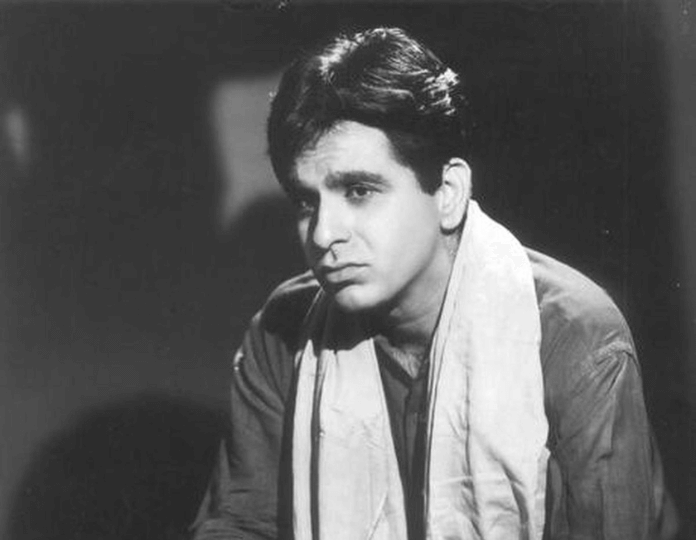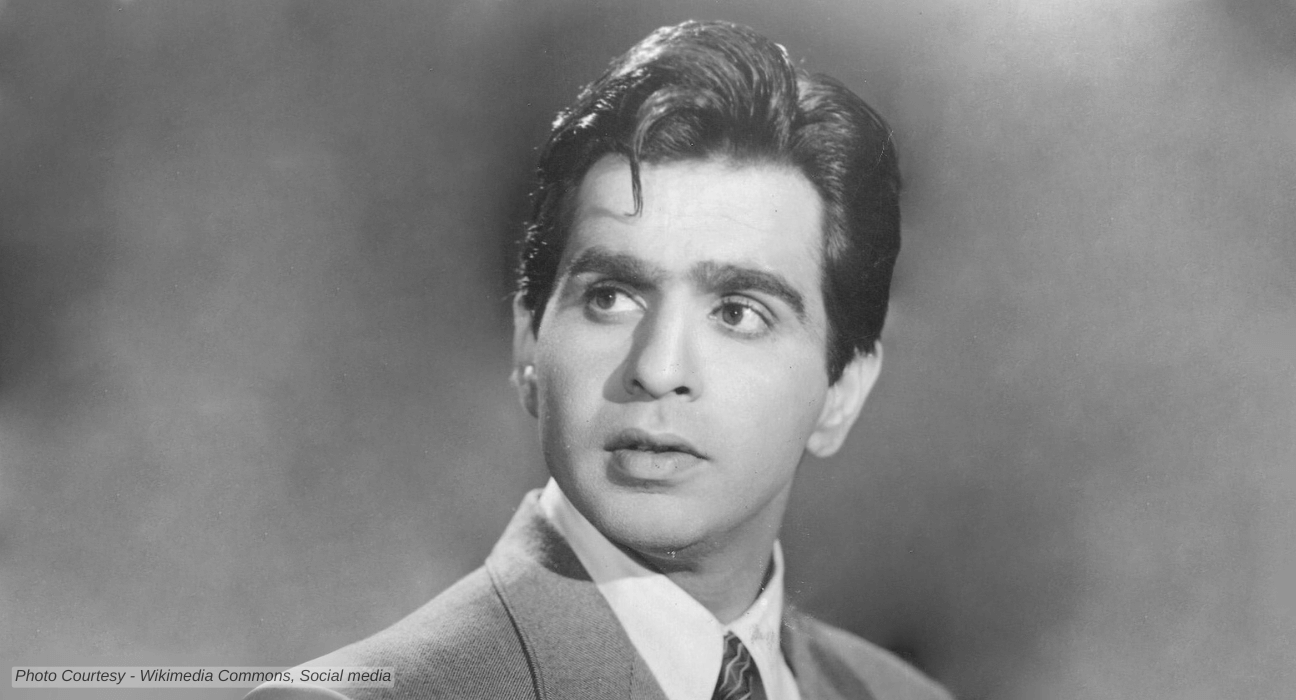Fondly referred to as the “Tragedy King” and “Abhinay Samrat” (Emperor of Acting), Dilip Kumar remains India’s most beloved acting icon. Dilip Kumar’s ability to stay relevant and adapt to changing times was a key factor in his enduring stardom. Over the years, he successfully transitioned from a romantic hero and action star to a character actor, showcasing his versatility and range as an actor.
Early Life and Career
Dilip Kumar was born Muhammad Yusuf Khan on December 11, 1922, into a Pashtun family in Peshawar. His father, Lala Ghulam Sarwar, was a fruit merchant, and his mother, Ayesha Begum, was a homemaker. The family moved to Bombay in the late 1930s. Yusuf Khan attended Barnes School in Deolali, Nashik. He later attended Anjuman-I-Islam Urdu School in Mumbai. His early exposure to literature and theatre sparked an interest in the acting, laying the foundation for his future career.
Despite his father’s wishes for him to join the family business, Yusuf Khan’s passion for acting led him to pursue a career in cinema. Initially, Yusuf Khan struggled to find his footing in the film industry. He worked odd jobs while actively seeking opportunities in the world of cinema. His talent and perseverance eventually attracted the notice of powerful people, opening the door for his Indian film debut.
How Yusuf Khan Became Dilip Kumar?

Yusuf Khan’s entry into the film industry was serendipitous. In 1944, he made his acting debut in the film “Jwar Bhata,” produced by Bombay Talkies. Yusuf Khan was hesitant to use his own name in films because of his father, who thought that the film business is not a noble profession.
Devika Rani gave him three choices for his screen name: Jahangir, Dilip Kumar, and Basudev. He answered he is okay with either, as long as it is not Yusuf. When Devika Rani chose Dilip Kumar to be his name, little did she know that it would become Indian cinema’s most famous and successful name in the coming years.
Dilip Kumar’s first film did not fare well at the box office, but it provided him a platform to showcase his talent. Despite an unremarkable start, his breakthrough came with “Jugnu” (1947) opposite Noor Jehan. The success of Jugnu, marked the beginning of a legendary career, propelling him to the forefront of Indian cinema. He then starred in a series of successful films, including “Shaheed (1948),” “Nadiya Ke Par (1948),” and “Shabnam (1949).”
Early Success
Dilip Kumar’s rise to stardom was marked by his versatility and ability to portray a wide range of characters. His breakthrough role came with the 1949 film “Andaz,” directed by Mehboob Khan. The film, which also starred Raj Kapoor and Nargis, was a major success and established Dilip Kumar as a leading actor.
In the 1950s, he make a name for his romantic and often tragic roles. His early films like “Arzoo,” “Tarana,” Aan,” “Shikast,” “Footpath,” Azaad,” and “Insaniyat” established him as the ultimate superstar. His intense and grounded acting process and the depth and authenticity he brought to his character earned him immense critical acclaim and a loyal fan base.


In 1952, he starred in Amiya Chakravarty’s “Daag,” in the role of Shankar, a man struggling with alcoholism and guilt. His portrayal of Shankar’s inner turmoil and redemption earned him his first Filmfare Award for Best Actor.
The Tragedy King
Dilip Kumar earned the moniker “Tragedy King” for his portrayal of ill-fated characters in several films. The films like “Mela,” “Jogan,” “Babul,” “Deedar,” “Sangdil,” “Daag,” “Udan Khatola,” “Devdas,” and “Yahudi,” had the tragic ending. His ability to convey deep sorrow and emotional turmoil with authenticity and restraint set him apart from his contemporaries.
Directed by Bimal Roy, “Devdas” is considered one of his finest performances and the pinnacle of his tragic acting. His portrayal of the lovesick and self-destructive Devdas is both haunting and poignant. It is widely considered one of Indian cinema’s best acting performances.
In 1954, Dilip Kumar Starred in Mehboob Khan’s “Amar” with Madhubala and Nimmi. The film was not any ordinary story, it portaryed Kumar as a the anti hero who does the unthinkable on screen. The film will always be remembered for its brave and controversial attempt at dealing with the subject of rape.
His acting style, characterised by depth, emotional range, and authenticity, revolutionised Indian cinema and set a benchmark for generations of actors. He approached the craft with meticulous preparation, intense dedication, and an unwavering commitment to bringing characters to life with unparalleled realism and conviction.
In 1957, he starred in B.R. Chopra’s social drama “Naya Daur,” with Vyjayanthimala, Ajit and Johnny Walker. In the film. Dilip Kumar played the role of Shankar, a tongawala who fights against unnecessary mechanisation and modernisation at the expense of people. One of his other significant films in that period was Bimal Roy‘s “Madhumati (1958),” with Vyjayanthimala. The noir mystery featured Dilip Kumar in the role of Anand, a man haunted by the spirit of his past lover.
The Versatality
After years of doing tragic films, it took a huge toll on his mental and emotional state, as he used to portray the characters on a personal and more emotional level. He was advised to do some light-hearted roles, the first of which was “Kohinoor,” in 1960.
Directed by S. U. Sunny “Kohinoor,” an action-adventure musical film featured him opposite Meena Kumari. The film was a huge success and is still remembered for the chemistry between Meena Kumari and him. It also has some memorable songs like “Madhuban Mein Radhika Nache Re” and “Do Sitaron Ka Zameen Par Hai.”
The same year released one of Indian film history’s most successful films, K. Asif’s “Mughal-e-Azam,” an epic historical drama that featured him in the role of Prince Salim. His portrayal of the passionate and defiant prince was both powerful and emotionally resonant, making the film a timeless classic.
Directed by Nitin Bose on the story by Dilip Kumar “Ganga Jamuna (1961)” featured him in the role of Ganga, a poor farmer who becomes an outlaw due to injustice and atrocities committed against him. His portrayal of Gunga’s love for his brother and his struggle against injustice added depth to the film’s narrative. The film started the trend of two brothers on opposite sides of the law.
It was the time when he also started doing fewer films. After Ganga Jamuna, his next film, “Leader,” came after three years. After that, he did only eight films in the next 12 years, which were Dil Diya Dard Liya, Ram Aur Shyam, Aadmi, Sunghursh, Gopi, Sagina Mahato/Sagina, Dastaan, and Bairaag.
Haitus and Comeback
After Bairaag, he took a hiatus of 5 years before starring in Manoj Kumar’s Kranti in 1981, a revolutionary drama that featured Dilip Kumar in the role of Sanga, a freedom fighter. In 1982 came Ramesh Sippy’s “Shakti,” a crime drama written by Salim–Javed, featured Dilip Kumar alongside Amitabh Bachchan. His portrayal of DCP Ashwini Kumar, a principled police officer, earned him another Filmfare Award for Best Actor.
In the 1980s, he acted in a few selected films like Vidhaata (1982), Mazdoor (1983), Mashaal (1984), Duniya (1984), Dharm Adhikari (1986), Karma (1986), Kanoon Apna Apna (1989), and Izzatdaar (1990).
In 1991, he starred in Subhash Ghai‘s “Saudagar,” a drama that featured him alongside Raaj Kumar. His portrayal of Veer Singh, a man caught in a feud with his childhood friend, remains a cult in his filmography.
Dilip Kumar’s acting process involved extensive research and preparation for his roles. He would immerse himself in the character, studying their background, motivations, and nuances. This methodical approach allowed him to deliver performances that were both believable and impactful. His dedication to his craft earned him the reputation of being a perfectionist, and his performances continue to be studied and admired by actors and filmmakers alike.


Personal Life and Legacy
Dilip Kumar was married to actress Saira Banu in 1966, and the couple remained together until his death on 7 July 2021. Despite facing challenges in his personal life, including a controversial marriage to socialite Asma Rahman, which ended shortly, Dilip Kumar remained largely a family man. One of his life’s most heartbreaking stories was revealed by Dilip Kumar in his autobiography, “The Substance and the Shadow,” that his wife, Saira Banu, conceived in 1972 but suffered complications leading to a miscarriage.
Dilip Kumar was known for his simplicity and down-to-earth nature. He was an avid reader and had a keen interest in literature and poetry. His love for music and singing added to his multifaceted personality. Despite his stardom, Dilip Kumar remained humble and approachable, earning the respect and admiration of his colleagues and fans.
Dilip Kumar’s enduring appeal can be attributed to his humility, dedication, and passion for acting. He remained active in the industry, taking on diverse roles and exploring new opportunities. His willingness to experiment and evolve allowed him to stay relevant and maintain his status as Indina cinema history’s most beloved actor.
Dilip Kumar on IMDB













Leave feedback about this